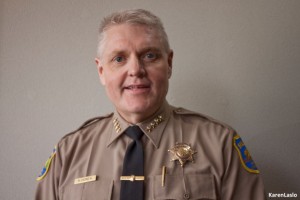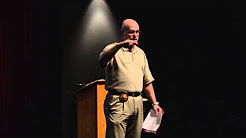by Dave Waddell
In a year of three deadly officer-involved shootings within five months in Butte County, overall attendance is down markedly among law enforcement personnel in Butte College’s annual Crisis Intervention Team (CIT) academy.
However, the Chico Police Department, involved in two of those fatal shootings, is sending three officers to the CIT academy, after having almost no presence there in recent years.

Chico Police Chief Mike O’Brien
The academy, which begins Monday at the Chico Fire Training Center, provides instruction in de-escalation techniques and in dealing with the mentally ill. For its first seven years, the 40-hour training was conducted by Andy Duch, a recently retired Butte County sheriff’s captain. Duch quit the CIT post in protest shortly after Chico police shot and killed Desmond Phillips, a 25-year-old mentally ill black man, in his West Fourth Avenue living room on March 17.
As of last week, just 16 law enforcement personnel had signed up to attend 2017 CIT, said Mike Maloney, a former Chico police chief who directs public safety education at the college. They included seven officers from the Paradise Police Department and six from the Butte County Sheriff’s Department.
In 2016, 29 law enforcement employees completed Butte CIT training, while 26 did so in 2015.
Maloney said Butte’s 2017 training will be led for the first time by 30-year law enforcement veteran and retired Chico police Lt. Linda Dye, who holds a master’s degree in leadership.
“She has experience and training as a member of the Critical Incident Stress Management Team, she is CIT-trained, and she worked closely throughout her career with Behavioral Health,” Maloney said.
The three Chico officers attending this year’s academy are more than the department sent to the four most recent academies — combined. Chico PD was represented by two officers in 2015, but had no one in attendance in 2013, 2014 or 2016.
Paradise PD has averaged sending five officers per year to CIT over the last three years, while personnel from the Oroville and Gridley PDs have rarely attended, according to Duch.
The biggest drop in involvement this year came from the sheriff’s office, which sent 14 personnel in both 2015 and 2016. The six enrolled this year include four correctional and two patrol officers.

Butte County Sheriff Kory Honea said the lower participation by his department is not a sign of any reduced regard for CIT. Honea said he’s proud that, since 2012, the Sheriff’s Department has sent 43 employees — including deputies, jailers and dispatchers — through the 40-hour academy. He also noted that one of the patrol deputies attending this year is a field training officer who will be able to teach others.
“I still strongly, strongly support CIT,” Honea said. “And I’m proud of the relationship I’ve developed with Butte County Behavioral Health.”
Honea said that when deputies encounter, for example, a person in mental crisis barricaded inside a home, “one of the first things we do is call Behavioral Health for either assistance or advice.”
Last week, Chico PD hosted an eight-hour crisis intervention training program that attracted about 100 attendees, according to Chico Police Chief Mike O’Brien. In attendance were about 60 Chico PD employees, including 42 officers. The same training will be repeated next month and be mandatory for all of the department’s “sworn” personnel not at the first session. The one-day sessions are being taught by Carole McKindley-Alvarez, a professor at St. Mary’s College in Moraga who describes herself as “an expert in mental wellness, diversity, and cultural humility.”
O’Brien, who called McKindley-Alvarez an “outstanding” presenter, also said Chico PD will be sending five officers to a week-long “Crisis Response Team Academy” in November.
Shortly after the Phillips killing last spring, O’Brien, in an email to ChicoSol, described the 40-hour CIT as “not cost or information effective” for his department. During the past four years, apparently only two officers in the 90-employee Chico PD completed a week-long CIT academy.
Duch resigned as academy leader in protest over how Chico PD’s commitment to crisis intervention training was being portrayed by O’Brien and Butte County District Attorney Mike Ramsey in the wake of the Phillips shooting.

“The ‘facts,’ as reported by Chico PD and DA Mike Ramsey in the media and community conferences about Chico PD’s level of participation and perceived value in Butte County CIT were overstated and deceptive,” Duch wrote in an email to ChicoSol shortly after the Phillips shooting. “Frankly, I don’t like the CIT program being used for propaganda by an agency with a dismal record of attendance and a worse record of implementation of CIT principles.”
In addition to the Phillips death, Chico police on July 23 shot and killed Tyler Rushing, 34, of Ventura after they say Rushing stabbed a private security guard and two police officers with a weapon that Ramsey has yet to describe. The shooting occurred after police busted open a door to a bathroom into which Rushing had fled after stabbing and being shot by the guard in downtown Chico. The officers and guard were not seriously hurt.
Another law enforcement-involved death occurred Aug. 22 when Mark Jensen, 56, of Durham was shot by a Butte County sheriff’s deputy near his residence after allegedly pointing a gun at officers following a standoff.
Both the Rushing and Jensen shootings are under investigation by the Butte County Officer Involved Shooting and Critical Incident Protocol Team, which Ramsey oversees.

The Phillips family, represented by prominent civil rights attorney John L. Burris of Oakland, filed a wrongful death claim for in excess of $25,000 against the city that was rejected July 23 by Jamie Cannon, Chico’s risk manager. The claim alleges that Chico PD used poor planning and “negligent police tactics” in firing 16 shots at Phillips and hitting him 11 times. One bullet, fired from a sharply downward angle, according to an autopsy report, tore through Phillips’ heart.
Dave Waddell is news director at ChicoSol.
